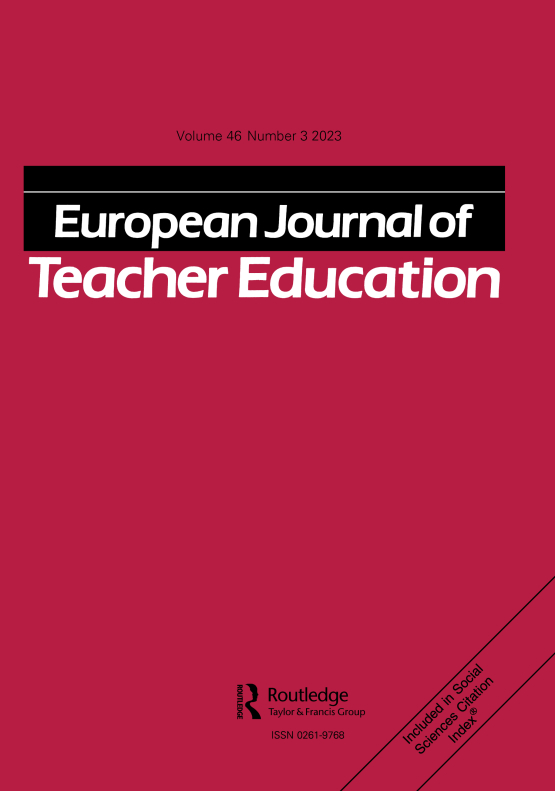Submit a Manuscript to the Journal
European Journal of Teacher Education
For a Special Issue on
European Journal of Teacher Education: Charting New Territories: Artificial Intelligence in the Context of Teacher Education
Abstract deadline
07 February 2024
Manuscript deadline
31 August 2024

Special Issue Editor(s)
Carmen Carrillo,
Universitat Autònoma de Barcelona
[email protected]
Maria Assunção Flores,
University of Minho
[email protected]
European Journal of Teacher Education: Charting New Territories: Artificial Intelligence in the Context of Teacher Education
Artificial Intelligence (IA) has the potential to disrupt many fields, and teacher education is no exception. The rapid advancements of IA technology have made possible the development of Artificial Intelligence in Education (AIED) tools and applications that can revolutionize teaching and learning practices in teacher education. During these recent years, particularly after the COVID-19 pandemic, these tools and applications have become more accessible to the teacher education community. This has raised interest in this topic but has also become a cause for concern.
Recent research shows that adaptive learning technologies, chatbots, intelligent tutoring or automated grading systems, among other AI-driven technologies, are used in teacher education to make teaching and learning practices more effective and efficient. However, their implementation poses several challenges and ethical concerns, including issues related to data privacy, bias and accountability. Political and pedagogical dimensions may also be identified.
Given the complexity of the theme and the rapid developments of AIED in the context of teacher education, there is a need to disseminate current research that gathers evidence on what has been done in the field to discuss how the teacher education community can leverage AI technologies considering their possibilities and addressing the related concerns. Also, it is necessary to gather data on what teachers and teacher educators need to learn and how they can be best prepared to integrate these technologies effectively and ethically in their day-to-day at work to debate possible ways to help these professionals learn about AI and be prepared for the possible impacts on their lives. With this purpose, this Special Issue aims to connect researchers in the field to share evidence on the potential of Artificial Intelligence in Teacher Education at pre-service and in-service levels, with a focus on the current trends, challenges and ethical and political considerations involved. This Special Issue welcomes original contributions that address theoretical and empirical contributions that include but are not limited to the following topics:
- What are the current trends and applications of artificial intelligence in teacher education and what are their implications for teaching and learning?
- What are the key challenges related to the implementation of artificial intelligence tools and applications into teacher education?
- What are the ethical and political challenges of AI-related technologies in teacher education, and how can they be addressed?
- What are the implications of artificial intelligence for teacher professional development, and how can teachers and teacher educators be best prepared to integrate these tools and applications effectively and ethically in their professional lives?
- What AI-based technologies and applications have the potential to transform the landscape of teacher education and what future research needs to be conducted to keep up with the rapid advancements in the field?
- What are the policy challenges of implementing AI-related technologies in teacher education?
Looking to Publish your Research?
Find out how to publish your research open access with Taylor & Francis Group.
Choose open accessSubmission Instructions
Important deadlines:
Abstract submission deadline: February 15th, 2024
- Abstracts should be submitted by email attachment to the co-editor Carmen Carrillo ([email protected]) with “EJTE Special Issue” as the subject line.
- Notification of acceptance/rejection will be sent by April 1st, 2024.
- Abstract should include name of Author(s), affiliation(s) and e-mail address(es), as well as a brief description of the study and its pertinence/relevance to the special issue theme.
- Length should be between 500 and 800 words.
- Please be aware that selection of the proposal abstract does not guarantee publication, as full manuscripts will be subject to blind review.
Deadline for submission of the full manuscript: August 31st, 2024
- Length should be 8,000 words (maximum) inclusive of figures, tables and references.
- Each article will be subject to two independent blind reviews.
- For further information on the journal’s submission guidelines please visit Instructions for authors.
Publication of the Special Issue: 2025